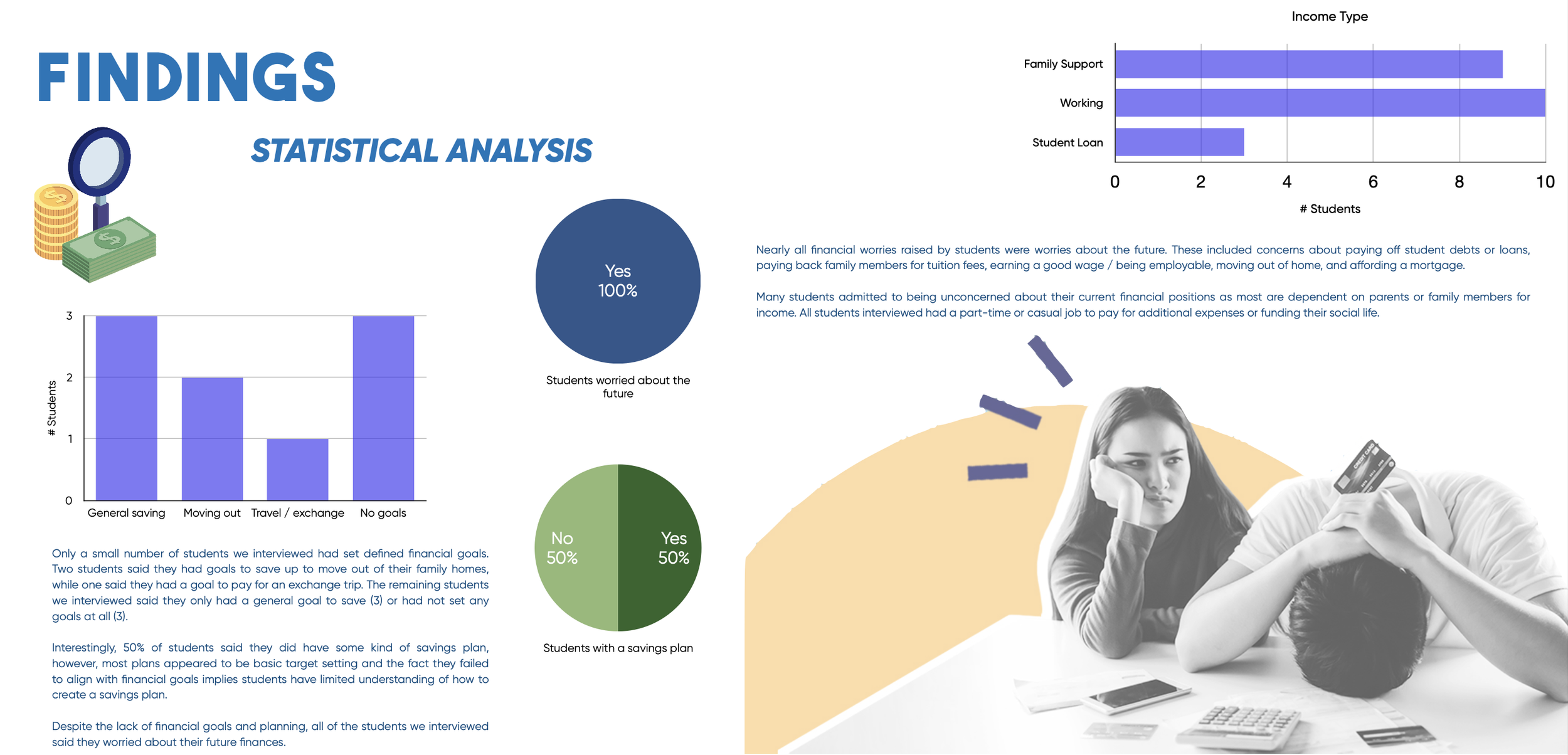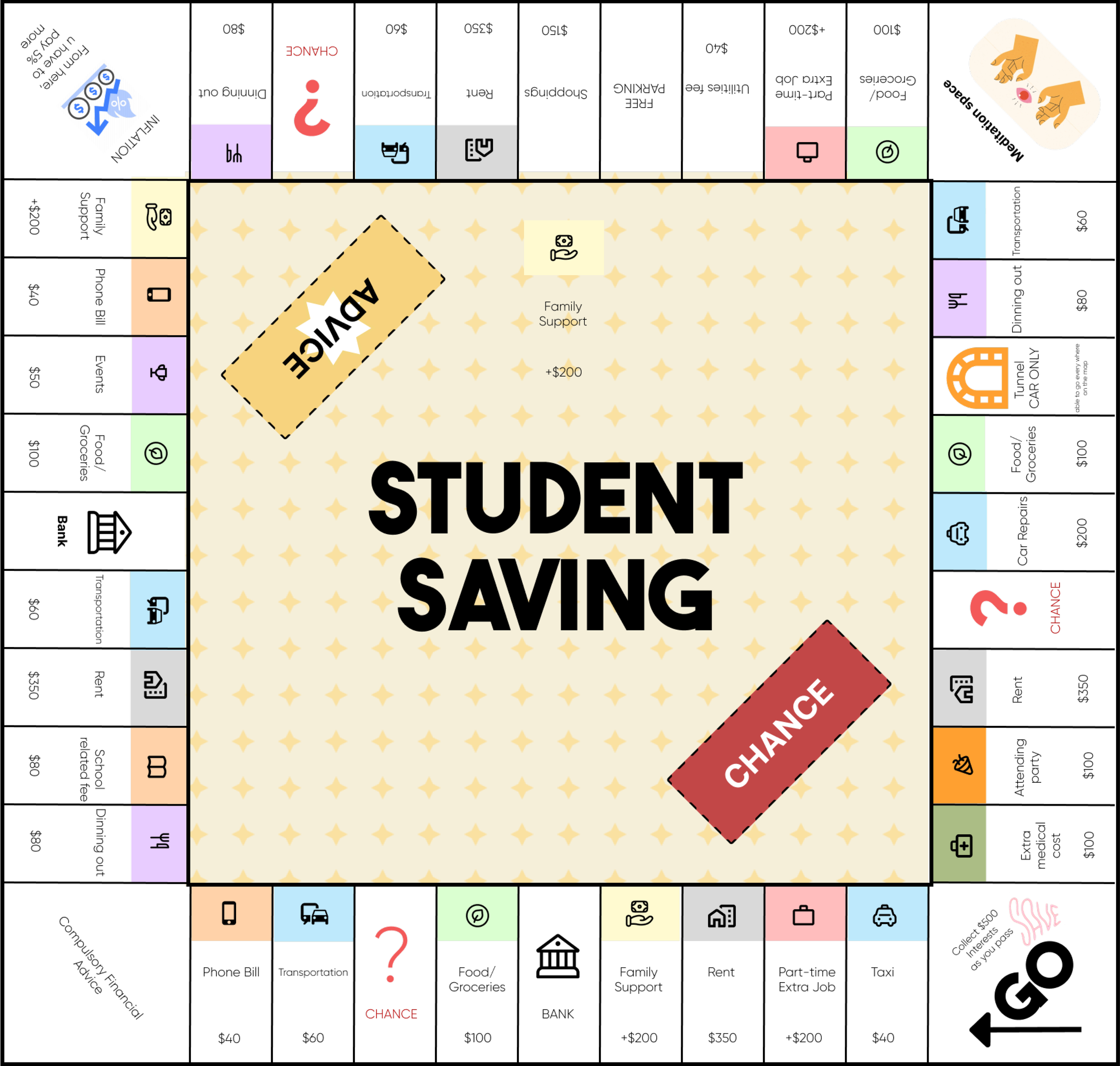
🎲 Student Saving Interactive Board Game 🎲
🎲 Student Saving Interactive Board Game 🎲
Student Saving Interactive Board Game 🎲
-
The rising cost of living in recent years has placed considerable financial pressure on many Australians with low income. University students have been hit particularly hard in the wake of a global pandemic that had devastating impacts on their education. During the COVID–19 lockdowns, many were unable to work while studying and struggled to meet their expenses.
However, while on-campus classes have returned and universities recommenced as normal, rising inflation rates mean students have not been able to financially recover. Now they are faced with accelerating student debt, increased tuition fees, rent inflation, and rising costs of food and everyday items. Some have even been forced to put their studies on hold or drop out due to the lack of affordable living.
Many students find it hard to manage their spending while trying to save under these conditions. They may lack budgeting knowledge and experience or face barriers controlling their money, such as time and cultural constraints. This research aims to address the financial issues students are facing under the cost of living crisis and offer a meaningful solution.
-
The long-term goal of this project is to design a solution that helps university students manage their finances under the developing cost of living crisis. It will involve gathering qualitative data through conducting interviews to develop a formalised student budgeting service. The service aims to provide students with long-lasting support and guidance beyond temporary financial aid. It may include tools for managing finances, as well as educational materials and support
-
To design and develop an educational tool, in the form of a board game, that helps university students effectively manage their finances amidst rising living costs, thus reducing financial stress and improving their financial literacy.
Role
Visual designer
Model designer
Tool
Figma
Adobe Photoshop
Adobe Illustrator
Team
Tamara Rosic
Shengjia Zhu
Miranda Qian Li
Category
User Experience 2023
Rationale
Student Saving is a board game we have designed to raise university students a variety of financial literacy awareness. This game will be available for students to play in pop-up areas around university campuses.
Our group decided on this solution as this board game is highly engaging and students are more likely to retain information when they are having fun. The Student Saving game requires active participation, and students must think critically to solve financial problems and make decisions, which allows them to apply financial concepts in a practical way. This solution also provides immediate feedback, so students can learn from their decisions and make adjustments which educate them the best methods of financial management.
Student Saving will help to teach financial literacy skills to university students include:
1. Money Management - helping students manage their money by allowing them to practice budgeting and planning their spending.
2. Save for the Future - the game will reward students for saving their money and teach them new techniques.
3. Understanding Loans and Interest Rates - the game involves the use of loans and interest rates with tuition fees, teaching students about their debt.
4. Understand Lifestyle Inflation - the game will teach students to understand the impact of inflation on their overall financial health.
5. Understanding Financial Risk - the game requires strategy and risk-taking by asking students to decide where they spend their money.
6. Understanding Asset Management - students can learn about managing their assets, including money, vehicles, and other resources, in order to increase their wealth and prosperity.
The Brief.
The cost of living crisis has made it increasingly difficult for university students to manage their finances effectively. Many students struggle to pay for basic necessities such as housing, food, and transportation, as well as the cost of tuition and textbooks. To limit costs, many students are forced to be dependent on their parents, either by living at home or borrowing large sums of money. The lack of independence has many students to feel like they are sacrificing their university experience.

Background Research
With the rising cost of living, students are not only facing stress from their studies and life, but they also suffer from the physical stress from continually increased tuition fees, rental fees, and daily expenses. Rising costs would cause them to discontinue or abandon their education, affecting their choices and opportunities.
User Insights
In total, 10 semi-structured interviews were conducted over a period of 2 weeks. We adopted a semi-structured approach and used a list of closed and open-ended questions as a script. This method was chosen because it allowed for flexibility, while still retaining a sense of order that would allow us to identify patterns. Interviews were conducted by all team members in-person and recorded with an iPhone.
Through surveys and interviews, we gathered data from a diverse group of students, which highlighted a common theme: there is a significant lack of financial literacy among university students, and many feel unprepared to manage their financial futures effectively.
Existing Solutions & Gaps
Lack of expertise in handling their finances would cause them to be unable to take the rising standard of living correctly. Therefore, instead of recognising this pressure as a standard pressure that each student should learn to overcome by themselves, we should deeply understand the background ethical problem of why the stress is created. By addressing and understanding the fundamental issues, we can solve the underlying problem that students face nowadays in an efficacy and valuable way.

Problem Statement
With the rising cost of living, university students face not only stress from their studies but also the physical stress of continually increased tuition fees, rental fees, and daily expenses. Such rising costs could force students to discontinue or abandon their education, thus affecting their choices and future opportunities. This situation exacerbates the divide between students' potential career pathways. Furthermore, statistics reveal that 44% of students exhibit symptoms of depression, and 37% suffer from anxiety disorders (University of Michigan News, 2023), indicating that university students are more susceptible to insurmountable psychological problems.
Our research at USYD has shown that most students need to enhance their financial management capabilities and possess inadequate knowledge about finances. A lack of expertise in handling their finances prevents them from adapting properly to the rising cost of living. Therefore, instead of viewing this pressure as a standard challenge that each student should independently overcome, it is crucial to deeply understand the underlying ethical problems causing this stress. By addressing and understanding these fundamental issues, we can effectively and valuably solve the problems that students currently face

Design.
Following user testing, we re-imagined Student Savings from a simple board game to be a life-size, interactive experience. Players act as board pieces and move around a giant board drawn on the ground. Landing on certain spaces will give players access to various pop-up vendors surrounding the board, where they can act-out various activities. For example: receive genuine financial aid from financial advisors at the “bank”; spend their money at a “supermarket”; and buy a car at the “car dealership”.
Reflection
Working on the Student Savings Prototype project was an enriching experience. My main task was to develop design ideas that balanced educational aspects with consideration of playability, which influenced our game design. I learnt the importance of user-centred design and effective collaboration within a team. The project emphasised the financial difficulties faced by students and the need for engaging educational tools. Developing prototypes honed my skills in data analysis, prototyping, and iterative design. Witnessing the positive feedback from user testing has been beneficial and confirmed the value of our efforts in promoting financial literacy among students.
















